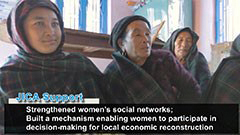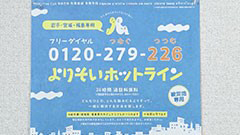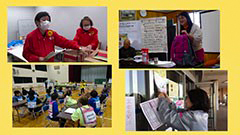- Home
- Our Work
- Types of Assistance
- Technical Cooperation
- Distance Technical Cooperation - JICA-Net
- JICA-Net multimedia-based learning materials Sample Activities
- JICA Governance and Peacebuilding Department To create a disaster resilient society - From the perspective of gender and diversity -
JICA Governance and Peacebuilding Department
To create a disaster resilient society - From the perspective of gender and diversity -
The material produced based on the knowledge from JICA Knowledge Co-Creation Programs (KCCP)
 JICA's support for 2015 Nepal Earthquake. It is essential to respond from the perspective of gender and diversity.
JICA's support for 2015 Nepal Earthquake. It is essential to respond from the perspective of gender and diversity.
In emergencies, such as the aggravation of natural disasters affected by climatic change and the spread of infectious diseases (pandemic) in the world, and the subsequent recovery and reconstruction processes, it is essential to respond from the perspective of gender and diversity.
We produced JICA-Net multimedia-based learning materials, "Gender and Diversity in Disaster Risk Reduction" (external link), which is based on the knowledge from JICA Knowledge Co-Creation Programs (KCCP) "Gender and Diversity in Disaster Risk Reduction" that has been conducted for Asian and Latin American countries since 2016.
 Violence, abuse, and harassment against women and girls that are already everyday occurrences are further amplified by physical and psychological stress during a disaster. The Social Inclusion Support Center established the Yorisoi hotline after the Great East Japan Earthquake.
Violence, abuse, and harassment against women and girls that are already everyday occurrences are further amplified by physical and psychological stress during a disaster. The Social Inclusion Support Center established the Yorisoi hotline after the Great East Japan Earthquake.
The material introduces examples of women, people with disabilities, LGBTI community, and a network by Indonesians, who are engaged in disaster preparedness groups in various places in Japan. It also shares the issues and responses against sexual and gender-based violence during and after disasters. The materials demonstrations initiatives reflecting the opinions of diverse population in Japan and leading to "Build Back Better" recovery to leave no one behind.
Moreover, it shows a variety of examples: The efforts of developing countries for disaster risk reduction and reconstruction from the perspective of gender and diversity, as well as global trends and JICA's initiatives.
* JICA Knowledge Co-Creation Programs (KCCP) is a training course focusing on one issue, which participants are invited from several countries.
To leave no one behind
 Disaster risk reduction where women play a major role have spread nationwide.
Disaster risk reduction where women play a major role have spread nationwide.
In Part 1, with some examples, the material explains how those who are socially vulnerable, such as women, are disproportionately affected by disasters and become more vulnerable position. Disasters do not impact all people equally.
In Part 2, it shows Japan's initiatives of disaster risk reduction and reconstruction from the perspective of women, people with disabilities, LGBTI community, and foreign nationals. Without the principle of "leave no one behind", disaster risk reduction and reconstruction cannot be effectively implemented.
In Part 3, focusing on global trends and JICA's international cooperation, it introduces JICA's previous examples of disaster risk reduction and reconstruction. It also remarks the personnel training in KCCP and responses against COVID-19.
Utilizing the material
Although it was difficult to interview face-to-face in Japan and abroad due to the impact of COVID-19, we succeeded to gather many examples by using online tools.
This material can be used for training in disaster prevention, disaster risk reduction and reconstruction support, especially for the KCCP "Gender and Diversity in Disaster Risk Reduction" as a learning material prior to the training or an orientation material after arriving Japan. Also, it can be used in the advanced and pre-dispatch training of JICA Japan Overseas Cooperation Volunteers (JOCV).
This material is made for people in charge of disaster risk reduction and gender equality and women's empowerment. However, because it is also easily understood for the general public, it could be shared in Japan and globally through lectures and YouTube channels by municipalities, women's centers around Japan, and associations of disaster risk reduction and prevention.
As of February 2022, we produced the Japanese and English versions of the material, and intend to produce multiple language versions, especially, Spanish one to use in Latin America where many disasters frequently occur.
We expect that the material will promote the perspective of gender and diversity in disaster risk reduction initiatives and international cooperation for the creation of disaster resilient societies.
NOGUCHI Takako
Office for Gender Equality and Poverty Reduction
JICA Governance and Peacebuilding Department
*The Material(s) mainly applied
Gender and Diversity in Disaster Risk Reduction
In emergencies such as natural disasters and the spread of infectious diseases, as well as in the subsequent recovery and reconstruction processes, it is essential to respond from the perspective of gender and diversity. Based on the experiences and lessons learnt from Japan's response to disasters and COVID-19, this material will introduce various measures and initiatives that reflect the views of diverse population and for "Build Back Better" recovery to leave no one behind.

- Thematic Issues
- Types of Assistance
- Partnerships with Other Development Partners
- Climate Change / Environmental and Social Considerations
- Evaluations
- Compliance and
Anti-corruption - Science and Technology
Cooperation on Global
Issues - Research
- JICA Development Studies
Program / JICA Chair - Support for the Acceptance of Foreign HRs / Multicultural and Inclusive Community
- About JICA
- News & Features
- Countries & Regions
- Our Work
- Thematic Issues
- Types of Assistance
- Partnerships with Other Development Partners
- Climate Change / Environmental and Social Considerations
- Evaluations
- Compliance and Anti-corruption
- Science and Technology Cooperation on Global Issues
- Research
- JICA Development Studies Program / JICA Chair
- Support for the Acceptance of Foreign HRs / Multicultural and Inclusive Community
- Publications
- Investor Relations
